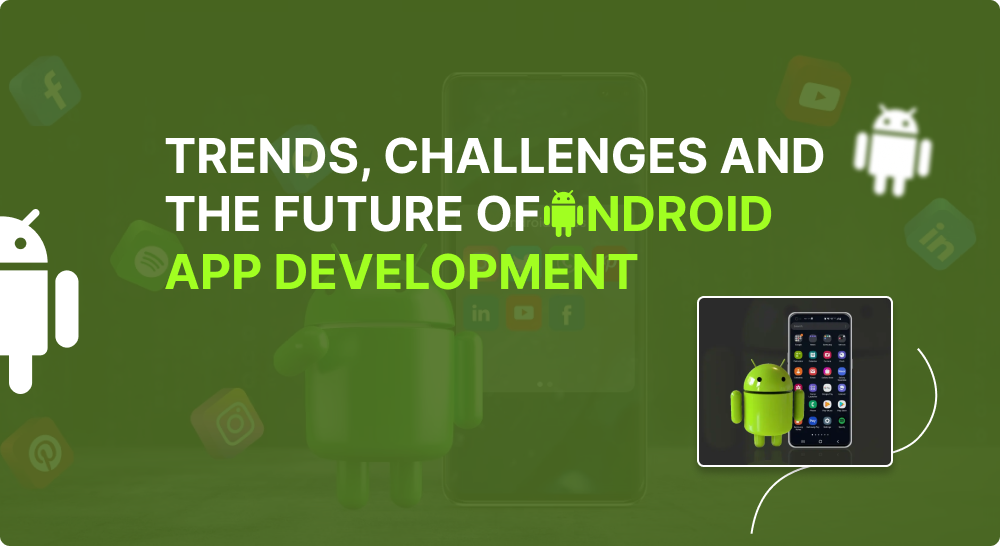With millions of devices running the mobile operating system globally, Android app development is constantly seeking innovative solutions in the ever-changing digital world.
The apps are entering a new stage with the catchphrase ’emerging’ technologies like Artificial Intelligence (AI) & Machine Learning (ML), 5G connectivity and the Internet of Things (IoT), which are redefining the very basics of how apps speak, operate, and deliver enhanced user experience and leeway of functionalities. With Android development growing rapidly every day, it’s essential to keep yourself updated with all the current trends as well as challenges to making high-performing and user-friendly applications, as the market demands individuals in that field.
About Android App Development
Over the years, Android app development has grown to a great extent and has given rise to a great ecosystem for developers to create feature-rich applications. Being open-source, flexible and having vast developer support, Android allows businesses to make apps for various users on different verticals.
The Android applications have changed the way users interact with technology in almost every field, from entertainment and finance to health care and education. Android has further fuelled the growth of adoption of cutting-edge technologies like AI, blockchain, and AR/VR. As hardware and software come to a point of continuous advancement, developers now have the opportunity to create these immersive experiences that are well beyond the realm of innovation.
Trends of Android App Development
-
Android applications are transformed by AI ML development to create personalised user experiences, intelligent automation, predictive analytics, etc. Chatbots, assistants, and recommendation engines are becoming smarter and more interactive due to the use of AI.
-
AI and ML are helping the developers improve the security features, automate workflows, and give real-time visibility to enhance the present of the user.
-
Widespread rollout of 5G will be the revolution of Android applications with faster data speeds, lower latency and better connectivity. However, with 5G, developers will have an opportunity to create apps like video streaming with improved quality, seamless cloud gaming, etc., with a more immersive AR/VR experience. This increases the bandwidth to allow real-time communication and better data processing, inducing new application paths for high performance.
-
The Internet of Things is reshaping Android development by allowing the continuous connection of devices. Nowadays, Android applications are rapidly assuming a vital role in the administration of computerised home devices, wearables and business mechanical advancement frameworks
-
The fact is that Kotlin has become the language of choice for Android development due to its concise syntax, improved safety features, and compatibility with Java. With Google’s official support for Kotlin, the number of developers adopting it has increased, as it is easier to code, less buggy, and better for the app performance.
-
Due to the increasing number of cyber security threats, Android developers are focusing on app security to ensure the user’s data is safe and their trust is maintained. In light of that, biometric authentication, data encryption, and secure API integration have become almost indispensable in order to ensure digital application safety from possible vulnerabilities and attacks.
-
Frameworks such as Flutter and React Native are making cross-platform development possible; this means that one can code an app for many operating systems using just one codebase. Progressive Web Apps (PWAs) are a thing, and they offer a fantastic offline experience on the web with push notifications, fast loading and much more.
Challenges of Android App Development
-
Finding a Strong Business Plan: Turning an app idea into a viable business model can be very tedious for many developers. It is critically essential to make a well-defined business plan that will help determine the target audience, monetisation strategies and market positioning. The most innovative apps can go nowhere or be pathetic without a solid plan.
-
Hiring the Right Development Team: Writing an impressive Android app is not a simple task. You need to have coding, UI/UX design, testing and backend management. Building high-quality, scalable applications is no walk in the park. The first and foremost thing is to find a development team with remarkable knowledge and experience of technical work.
-
Finalising the MVP Scope: Developers make a mistake by building fully fledged apps without testing a Minimum Viable Product (MVP). Building an MVP ensures that the app concepts get validated, get user feedback and adjust features before the full-scale development, thereby minimising risks as well as costs.
-
Securing Funding for Development: The biggest challenge for developers is funding, especially startups. To finance such app development, marketing and maintenance, app developers have to raise capital through angel investors, venture capitalists or crowdfunding platforms. Scaling an app becomes hard without adequate funding.
-
Ensuring App Quality through Testing: Poor app performance, security vulnerabilities, and user dissatisfaction can occur if you skip testing phases. Alpha and beta testing of an app helps to eliminate bugs and make an app user-friendly and ready for the market before its official launch.
Future of Android App Development
Innovation and user-centric technology are what drive the future of Android development. AI-driven automation, AR/VR experiences, and blockchain security solutions will be critical in driving the features of the app. By integrating edge computing with Android applications, the time of data processing is quickly reduced, and there is a reduction in cloud storage dependence.
Additionally, there will be improvements in voice recognition and natural language processing to enhance intuitive and responsive voice assistant interactions. With enriching sustainability, developers will start to develop energy-efficient applications that optimise battery as well as data consumption.
Final Words
The field of Android app development is changing with each passing day, and there is always a new trend that defines the path for mobile apps. Developers setting their feet in new technologies of artificial intelligence, the Internet of Things, and 5G, to name a few, will win this race. Overcoming challenges like funding, security, and development complexities requires strategic planning and technical expertise. The future of Android development holds limitless potential, and those who adapt will thrive in this ever-changing industry.
Are you looking for android app development services in India? Contact FODUU. A top android app development company in India offering budget friendly mobile (Android/iPhone) app development services to clients globally.
Related Post: The Ultimate Guide to Android App Development










